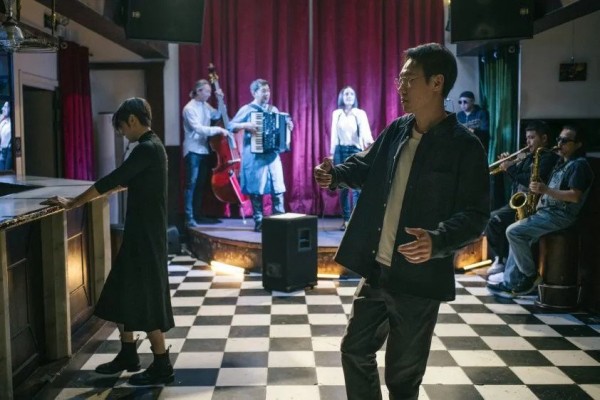-
THE SHADOWLESS TOWER 白塔之光 (zhang lu 2023)
ZHANG LU: THE SHADOWLESS TOWER 白塔之光 (2023)

YAO HUANG, XIN BAIQING IN THE SHADOWLESS TOWER
Slow developer
The Shadowless Tower is an ambitious film, striving for a novelistic complexity through a rambling, episodic structure on a limited budget. The writer-director Zhang Lu is Korean-Chinese and grew up in China's Yanbian Korean Autonomous Prefecture, which partly borders on North Korea and Russia. The main character here, however, is thoroughly Chinese in culture and speaks Mandarin but can be amused by Cantonese. Formerly a writer and academic, Zhang Lu was led by film success in the 2000's to become a full-time director. The main action is set in contemporary Beijing, where the ancient "shadowless tower, " a Yuan Dynasty White Pagoda, is a symbol of stability for the protagonist - a middle-aged food critic, divorcee and former poet, Gu Wentong (Xin Baiqing). Preparing an article on a small traditional restaurant, Gu is assisted (evidently not for he first time) by a young woman photographer with the odd name of Ouyang Wenhui (Yao Huang) - a cute gamine type, a little like Faye (Wong) in Wong Kar-wai's Chungking Express with an extra fuck-you vibe. She continually challenges and mocks Gu but he likes it.
Gu may be much older than the girl but he's tall, cuts a good figure, and is a good dancer. His flaw is to be excessively polite, allegedly the cause of his divorce. Ouyang Wenhui is drawn to him and they go on various jaunts.
More of Gu's food critic work might have been interesting; so, of course would be more depth in exploring this odd couple. But as David Rooney says in his review of this film for The Hollywood Reporter, Zhang's people are cut off, "orphaned, disconnected, separated from the roots that give them an emotional and spiritual mooring." Both Gu and his father, Gu Yunlai (Tian Zhuangzhuang), from whom he has been cut off for decades, live alone in small rooms. Since this is the case, the film can't develop any relationships in much depth; it only plots the belated beginnings of them.
Gu also has a small daughter whom he sees regularly. He has arranged, with his wife's consent, for the six-year-old to live with his sister and her husband. She is a smart bundle of joy (known as "Smiley") and leaps into his arms, challenging him (like xOuyang Wenhui?) and showing off - in short, a powerful distraction. The opening sequence - it takes thirty-two minutes to get to the opening title - is a visit to his mother's grave with his daughter, sister, and brother-in-law. Yes, Gu is cut off from his family, just not out of touch with them. He is leading up to finally seeing his father, an old man, of course, who likes to fly kites alone on the beach, an amusement he began at thirty with his son, now practiced alone.
There is a strange scene where Ouyang Wenhui and Gu rub together affectionately standing in a crowded bus, when that is interrupted by a furor over a inappropriate touching of a women by a man who is chased and caught. Ouyang Wenhui and Gu get off and he reveals that his own father was punished for such an act years ago, and in the aftereffect of that, his mother cut off relations with him and he was never seen again. In the aftermath of his mother's death Gu is led to seek out his father after so many years.
Gu has learned that his father has long lived in Beidaihe, a resort town, but working as an "abacus man" (an accountant), he made it a practice twice a year to ride a bicycle - he eschews public transportation - on the long 300-km. distance from there to Beijing to see his two children. His brother-in-law has stuffed a piece of paper into Gu's hand with his father's phone number on it, and this is when he starts calling it from pay phones, but not speaking.
This film about disconnectedness contains neat connections. A link-up with the Yuan Dynasty White Pagoda, comes when Gu's new young girlfriend books a room for them in a hotel that adjoins it. She also connects with both him and his father because he effectively lost his dad at age five, the time when his father was banished by his other. She was orphaned and adopted at age five from Beidaihe, and that is where his father has been living. It's a natural for the girl, who still identifies with Beidaihe despite being raised elsewhere, to go to Beidaihe with Gu [I ]fils[/I] for her to revisit her place of origin and for him to reconnect with his father. To describe this makes it sound contrived, but the plot line unfolds in a way that feels offhand, a process of discovery.
Rooney calls this film a "minor-key drama" and says it's "too muted and elusive to break beyond festivals," but admits that its "melancholy spell" nonetheless "stays with you." It's cunningly but also confusingly constructed; better to watch it twice, or after careful study of a plot summary or press kit. It's interesting, but I can't recommend it to everyone. I will recommend it to any fans of contemporary Chinese film and followers of Asian film festivals. There, Zhang Lu will be a name to watch for.
The Shadowless Tower 白塔之光, 134 mins., debuted at the Berlinale.; also Hong Kong, Shanghai, Beijing and El Gouna (Egypt). It was screened for this review as part of the New York Film Festival where it shows Sept. 30, a North American premiere including an Q&A with Zhang Lu.
Last edited by Chris Knipp; 02-27-2024 at 12:39 PM.
 Posting Permissions
Posting Permissions
- You may not post new threads
- You may not post replies
- You may not post attachments
- You may not edit your posts
-
Forum Rules





 Reply With Quote
Reply With Quote
Bookmarks